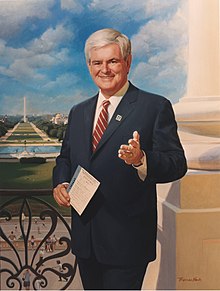I think it's about time we take a good look at Newt Gingrich's plan to reform welfare entitlements through "promoting growth and innovation", detailed in
this 48-page white paper.
First and foremost: Gingrich (or his writers) use very idyllic language which sounds very plausible. It's the same sort of language Gingrich employs in debates with great success. I ask the reader to ignore it, and focus only on the particulars of his plan. In other words, I want you to be Joe Friday for the next several minutes.
Second, the reader will notice something which is almost laughable: The white paper uses the words "growth" and "innovation" dozens of times in 48 pages, but gives no details about how such "growth and innovation" would occur. It's a meaningless catchphrase, like "Hope and Change".
Third, Newt Gingrich firmly cements his opposition to cuts in government spending in the introduction:
The first path is the "fantasy" option: Pretend that everything is working just fine, and fundamental change is unnecessary (...) The second path is the "Austerity" option: Conceding that we will not become as prosperous and secure as we once thought we would, so we should be prepared to settle for less (...) The third path is what this paper will address: Securing Americans' retirement, expanding world-class healthcare for everyone, and lifting millions of Americans out of poverty through growth and innovation.
(Emphasis mine)
To review: According to Gingrich, budget-cutting (otherwise known as "austerity") is a defeatist attitude; and one of his goals is "expanding healthcare for everyone". Note again that Newt camouflages his intentions by mixing his ideas with the language of fiscal conservatism.
The white paper is organized into three "Steps", which I will also use to analyze the proposal.
Step 1: Social Security Personal Accounts. Gingrich is not alone in championing the Chilean model for Social Security reform, already implemented in part of Texas- in fact, every Republican candidate except Mitt Romney is championing exactly this reform. Newt does, however, provide a fascinating history of the Chilean system, and I'm highly impressed by the thoroughness and accuracy of this section of the white paper.
Step 2: Fundamentally Reforming The Welfare Empire. On welfare, we encounter some problems. Gingrich provides excellent and indisputable background material about the nature of the "welfare trap", and some history about his much-touted welfare reforms of 1996. It's fortuitous that I had decided this past weekend to write a four-part series about taxation, and had decided to include a discussion of the
Negative Income Tax Credit, as it's directly relevant to this discussion.
There is one fact about Gingrich's 1996 reforms which goes underreported: The reforms, which Gingrich claims resulted in a 50% reduction in welfare recipients,
had no such effect.
Backstory: Prior to 1996, the federal government operated a program called "Aid to Families With Dependent Children" (AFDC), which paid out benefits to low-income persons with minor children. This program existed in addition to food stamps, housing assistance, heating assistance, and a number of other grants.
Gingrich's reform restructured AFDC into a new program called "Temporary Assistance to Needy Families"
(TANF), which still exists today. The key component of TANF was a two-year limit on benefits for the parent (not the child[ren]). This much is already known by most of us on the right.
What isn't commonly known is that the TANF Act also eased the procedures for certifying people with disabilities. As the number of "welfare recipients" shrank, the number of "disabled" persons grew exponentially.
Stated another way:
The bulk of the people removed from the welfare system in 1996 were merely reabsorbed into the federal disability system, which is part of the Social Security Administration. Gingrich's claims of success, and the figures he presents to prove this success, don't reflect this transition from welfare to pretended disability.
Among Gingrich's assertions:
As a result, total federal and state spending in constant dollars dropped 31% between 1995 (under the AFDC program), and 2006 (under TANF), and down by more than half of what it would have been under prior trends.
This figure doesn't reflect a painful fact: State and Federal funding for other assistance programs intended for legitimately disabled people, such as funding for group homes for the mentally and physically handicapped, was diverted to pay for the rash of new disability checks being issued.
This highlights a basic problem with the welfare system:
Cash benefits are prone to fraud. I discuss this problem in greater detail in my Negative Income Tax Credit article (linked above).
While the build-up of this topic in the white paper is extensive, the
solution part of this section is pretty brief:
1) Reduce assistance to working families to include only the minimum wage, the Earned Income Tax Credit, and the Child Tax Credit.
This promotes exactly the problem Newt's 1996 reform was intended to abolish:
It provides incentives to have children one can't afford. EITC and CTC are both based on the number of children one has. People without children would be shut out of the safety net, while people in the net would recieve more money with each new child.
2) Transform unemployment into a job training program.
As I illustrated in my analysis of Mitt Romney's
59-point plan:
Government retraining programs put very few people back to work. They are a perfect example of a feel-good program- a waste of money which "feels" productive but really isn't.
To illustrate why, consider this hypothetical: You are an employer looking to hire a mechanic. You have two candidates, one with 10 years' experience as a mechanic, and another who just recently graduated from trade school and has never held a job as a mechanic. Which candidate do you hire? Obviously, you would hire the more experienced applicant.
This is a fatal flaw of retraining programs, which cannot be resolved by any amount of "restructuring".
3) Block-grant federal welfare funds to the states.
This is a relatively sound idea, assuming one particular: States aren't required to give excess funds back to the federal government, or spend the funds exclusively on welfare. If states are required to give back money not disbursed through welfare programs, then there is no incentive for a state to
not spend the money by enlarging its welfare programs.
In other words, if the money must be spent only on welfare or given back, then governors will naturally splurge on their constituents by expanding their welfare programs- and in the process, make more new entitlement promises which can't be sustained long-term. On the other hand, if states may devote excess welfare funds to other programs, then the states have an incentive to spend federal welfare dollars more wisely.
Newt's white paper doesn't address this issue.
4) Provide federal incentives for welfare recipients to establish two-parent households.
I have only one comment to make on this point: This is being proposed by the guy who called Paul Ryan a "right-wing social engineer" for advocating
Medicare reform. This constitutes monumental hypocrisy on Gingrich's part.
Note something conspicuously absent from these points:
Newt makes no mention of reforming the fraud-prone disability system he helped to create. In other words, leaving the disability hole open would nullify most of these reforms via the same mechanism which nullified his original welfare reform concept in 1996.
Step 3: Healthcare Reform: Obamacare versus Patient Power.
As I detailed in
this article, Newt Gingrich was- until only six months ago- a long time, ardent supporter of government-run medicine. He championed the individual mandate a decade before Mitt Romney did, and he helped to craft Medicare Part D.
In reading the first few pages of this section of the white paper, you'd almost believe Gingrich really has changed his mind in the short span of six months. He gives an excellent argument against Obamacare and socialized medicine, and describes the "Third-Party Payment Problem", long-recognized by fiscal think tanks as one of the major factors driving up the cost of health care.
He even references Paul Ryan's reforms- precisely the same reforms Gingrich called "right-wing social engineering" only six months ago (see above).
Gingrich's solution to the cost of health care is Health Savings Accounts combined with high-deductible insurance policies- a stock-standard, free-market approach to reducing medical costs. As with the Chilean model, this is another reform being championed by every other GOP Presidential candidate except Mitt Romney.
He extends this concept to include HSA/high-deductible account for Medicaid recipients- something already done in Indiana by Governor Mitch Daniels with the "Healthy Indiana Plan".
Gingrich borrows Daniels' program, but gives him no credit whatsoever! This is just plain despicable.
In sum: Gingrich's plan employs a worthless catchphrase to inspire a message of "hope and change"; he establishes his intent to avoid spending cuts and his disdain of those of us who champion them; his good ideas are commonly-accepted ideas borrowed from other venues (some are plagiarized with no credit given- for shame, Professor!); his welfare plan merely perpetuates a problem he created; and, as expected, the paper distorts or ignores substantive portions of Newt's record.
Stated differently:
It's more proof of Newt's slick salesmanship.












